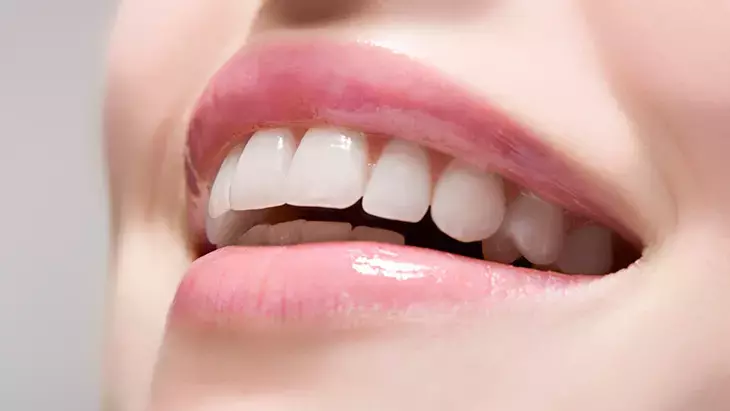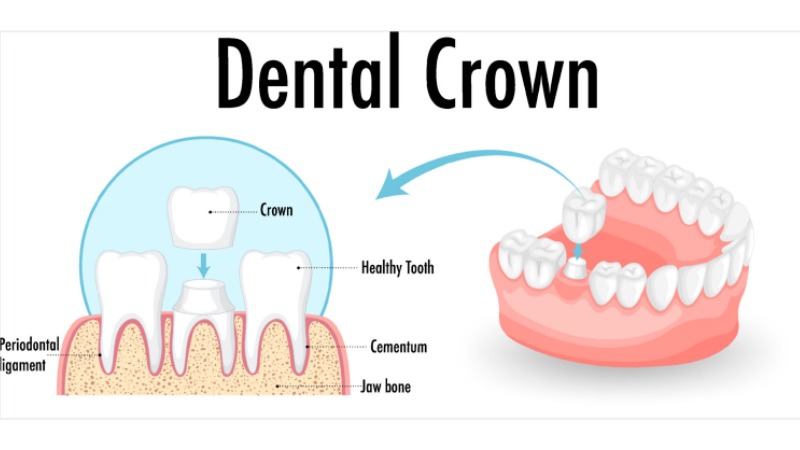Strength and Aesthetics for a Perfect Smile

Zirconia crowns are biocompatible, durable dental restorations produced from zirconium dioxide. Consider zirconia a high-tech crown option to metal or porcelain. They integrate effortlessly with your smile and appear like genuine teeth. Due to its resilience, zirconia crowns can survive everyday biting and chewing. They're biocompatible, so they won't create oral problems. Zirconia crowns in Antalya are a durable and beautiful dental treatment for tooth restoration and smile enhancement.

Turkey zirconium crowns may be the solution in cases:
Cracked, chipped, or broken teeth: Zirconium crowns restore function and beauty to cracked, chipped, or severely fractured teeth because of their strength and longevity.
Seriously discoloured teeth: Coffee, tea, and prescription stains may discolour teeth. Whitening procedures may fail. Zirconium crowns mirror your teeth's natural translucency and colour for a permanent, confident smile.
Missing teeth: Antalya Zirconium crowns, along with dental implants, offer natural-looking replacements. They match your teeth to restore chewing function and a beautiful smile.
Extensive fillings: Large or failed fillings weaken and damage teeth. To replace bulky fillings and create a consistent, stunning smile, zirconium crowns are durable and attractive.
Crooked teeth: Zirconium crowns may straighten and balance slight misalignments without braces.
These unusual crowns combine beauty, robustness, and biocompatibility, making them popular with residents and visitors. What makes them special? Discover why zirconia crowns may be the best fit for your smile:
Step by step zirconium crown and veneer procedure in Turkey:
Consultation and planning: We inspect your teeth, listen to your problems, and discuss your goals during your appointment. X-rays and digital scans may be taken for a detailed treatment plan.
Preparing the throne: Following this, a gentle dental preparation for its crown is made. This includes removing a little enamel to make room for the crown and ensure a good fit. To make it painless, we'll numb the region.
Capturing your smile: Scanners, whether digital or conventional, capture impressions. These thorough impressions guide your bespoke zirconia crown for a flawless fit and natural appearance.
Temporary stand-in: You will wear a temporary crown while the lab makes your permanent crown (2–5 days). This preserves your prepared tooth and lets you try out your new grin for a day or two.
Bonding for beauty: Your permanent Antalya zirconia crown is made to match the colour, shape, and level of transparency of your teeth. We'll gently cement the crown for a secure fit.
Post-crowning care: To maintain your beautiful new smile, brush twice a day and floss once a day. Regular dental exams are also critical for crown longevity and oral health.
After zirconia crown procedure in Antalya:
Zirconia crown in Turkey price is £160 per crown. Zirconia crown prices in Turkey depend on numerous factors:
No, zirconia crown does not hurt.
Before tooth preparation, you'll be numbed with local anaesthesia. This reduces procedure pain. The gums may be sensitive after the operation. Over-the-counter pain medicine or cold compresses may relieve this temporarily. Modern dentists use less invasive methods to reduce tissue loss and pain.
Everyone feels pain differently. The operation is usually pleasant; however, some individuals may be sensitive.
Fortunately, zirconia crown insertion usually uses local anaesthesia, minimising your pain.
Rarely used alternatives:
Optimal maintenance can extend the life of zirconia crowns to at least ten to fifteen years.
Yes, zirconia crowns treatment is worth it. To assist you in making a decision, let us analyse the pros.
Zirconia crown Antalya is naturally clear, just like tooth enamel, which gives it a beautiful, uniform look. These crowns are stronger than regular ones, resisting chipping, cracks, and wear. Zirconia comes without metal, making it perfect for allergy sufferers and biocompatible patients. Because zirconia is strong, less tooth structure is needed for installation, conserving your original tooth and perhaps lowering discomfort.
Yes, zirconia crown procedures are safe with trained and experienced Turkish dentists.
Turkey has sophisticated dental facilities with cutting-edge equipment and rigorous safety and hygiene regulations. Turkish dentists follow strict guidelines and undertake extensive training to guarantee patient safety during zirconia crown treatments. Biocompatible zirconia is well-tolerated by the body and unlikely to induce allergies. This makes zirconia crown treatments in Antalya safer.
Zirconium oxide-only group leader. Its strength and endurance make it resistant to chipping, cracks, and wear. Suitable for most situations, particularly teeth that require extensive repair or high chewing function. Somewhat less transparent than other alternatives, although improvements are coming.
Beautiful, strong, and attractive. A durable zirconium core is paired with a porcelain exterior. The porcelain layer's translucency and hue match the approximate tooth enamel for a more authentic appearance. Ideal for repairing front teeth or other cosmetic regions.
Getting the most natural look. It mimics tooth enamel almost perfectly, made of a particular zirconium that transmits light well. Ideal for people who are interested in front tooth restoration or aesthetics. Though less durable than solid zirconia, improvements are making them stronger.
Similar to solid zirconia, but coloured differently. Integrated colour eliminates the need for porcelain. Even if chipped or shattered, it provides a continuous crown colour. Suitable for people concerned about colour incompatibilities in traditional layered crowns.
Your requirements and priorities determine the perfect zirconia crown. Take into account tooth position, aesthetics, budget, and strength.
Zirconia crowns have high success rates. Studies show:
After zirconia crown implantation, most patients may travel comfortably for 24-48 hours. This period facilitates early healing and reduces cabin pressure-related issues. Everyone recovers at their speed. Ask your dentist for a personalised recovery plan. Longer flights or those with large altitude changes may need additional recuperation time. Discuss any health issues with your dentist to ensure flying after the operation is safe.
Eat yoghurt, mashed potatoes, scrambled eggs, and soup to prevent severe temperatures. To recover and avoid dry mouth, which may hurt, hydrate with water and unsweetened beverages.
As your sensitivity lessens, offer cooked veggies, spaghetti, and soft bread. Avoid sticky, crunchy, and hard foods like nuts, raw vegetables, and candies. These can damage or remove your new crown. Extreme heat and cold might create transient sensitivity. Eat your meal when it cools.
If you feel pain while eating, adjust your meal selections.
Turkey's dental treatment is cheaper than in many Western nations. This may make zirconia crowns, which cost more upfront, more affordable for budget-conscious people. Do not sacrifice quality and expertise, even if cost is appealing. Turkey has several skilled dentists who use high-quality zirconia crown materials and innovative methods. Turkish dental facilities use sophisticated technology and stringent sterilisation standards to provide safe and sanitary treatment.
Combine dental care with a fantastic Turkey vacation. Reach your smiling objectives while exploring the rich history, lively culture, and breathtaking scenery. Many Turkish clinics provide personalised treatment regimens for overseas patients, guaranteeing clear communication and meeting your demands.
No, zirconia crowns with stand discolouration better than porcelain. Zirconia does not discolour, although the bonding agent and habits might damage the crown's look. Smoking, dark-colored food and drink, and poor dental hygiene may discolour crown margins. Regular dental cleanings and oral hygiene may avoid stains and preserve the crown's beauty.
Both zirconia and porcelain crowns offer benefits, and the patient's requirements and preferences determine which is best. Since zirconia crowns are strong and durable, they are ideal for repairing molars and teeth exposed to vigorous chewing. These crowns withstand chipping and breaking better than porcelain ones. Due to its translucency and ability to match real teeth, Antalya zirconia crowns seem natural. However, porcelain crowns are very attractive and are typically used for front tooth restorations because they mix flawlessly with adjacent teeth. For patients with limited crown placement space, they may be better.
Zirconia crowns are durable and trustworthy because dental cement bonds them to the tooth structure. They are not difficult to remove, but a dentist must use specialised instruments and procedures. Removing the crown intact may be complex.
No, zirconia crowns are not permanent. But they are long-lasting dental restorations. Zirconia is durable; however, dental hygiene behaviours like tooth grinding and ordinary wear and tear might affect its lifespan. Antalya Zirconia crowns may endure for years with appropriate care, offering patients a dependable and attractive dental option. They may need replacement owing to natural wear or gum or tooth alterations.
You can safely choose LD Clinic to have your dental treatments in Turkey. We will be glad to receive your call and answer your questions. Have a healthy day.